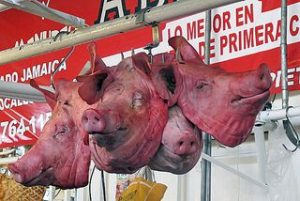Background: Toxoplasmosis is caused by the protozoon Toxoplasma gondii, which is one of the most widespread parasites that infect animals and humans worldwide. One of the main routes of infection for humans is through the consumption of infected meat containing bradyzoites in tissue cysts. Pork is one of the foremost meat types associated with outbreaks of acute toxoplasmosis in humans (photo, right, from http://www.mexicocooks.typepad.com).
 Materials and Methods: Sixty blood samples were collected from finished pigs at slaughter and their sera was evaluated by an indirect-IgG ELISA. Matched muscle samples were obtained from the tongue and loin. Whole blood and tissue samples were evaluated to search for T. gondii DNA using a nested-polymerase chain reaction.
Materials and Methods: Sixty blood samples were collected from finished pigs at slaughter and their sera was evaluated by an indirect-IgG ELISA. Matched muscle samples were obtained from the tongue and loin. Whole blood and tissue samples were evaluated to search for T. gondii DNA using a nested-polymerase chain reaction.
Results: Seroprevalence of T. gondii was 96.6% (58/60) of sampled pigs. Meanwhile, T. gondii DNA was present in 23.21% of tongue tissue samples (13/56), 7% of loin tissues (4/57), and 0% in blood samples (0/44), respectively. Two pigs were serologically indeterminate.
Conclusion: This is the first report of the presence of T. gondii DNA in tissue samples obtained from finalized pigs. Results from the present study suggest a high exposure to T. gondii in pigs intended for human consumption from the tropical region of Mexico. Thus, the consumption of some undercooked pork meat meals typical from the southern region of Mexico could represent a significant risk for acquiring infection for the human population.
Presence of Toxoplasma gondii in pork intended for human consumption in tropical southern of Mexico
Foodborne Pathogens and Disease. September 2016, ahead of print. doi:10.1089/fpd.2016.2165.
IB Hernández-Cortazar, KY Acosta-Viana, E Guzmán-Marin, A Ortega-Pacheco, JF de Jesus Torres-Acosta, M Jimenez-Coello
